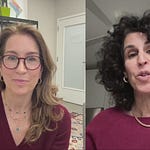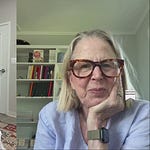EPISODE SUMMARY
In this week’s live Q&A, Dr. Lucy McBride dives deep into the complex and often misunderstood topics of weight loss, anxiety, and how to navigate medical advice in a noisy health landscape. With her signature warmth and clarity, she explores what it means to approach health from a place of awareness, acceptance, and agency—not shame or quick fixes. This episode is a must-listen for anyone feeling overwhelmed by wellness culture or confused about how to pursue sustainable well-being in real life.
KEY CONCEPTS DISCUSSED
1. THE TRUTH ABOUT WEIGHT LOSS
Weight loss is not a moral issue—it’s a medical one when appropriate.
The first question to ask isn’t how, but why you want to lose weight.
The number on the scale is only one small piece of the puzzle; context matters.
Effective weight loss centers on sustainable behaviors, not restriction or shame.
She challenges diet culture’s toxic messaging and emphasizes a whole-person, bio-psycho-social approach.
2. WHAT ACTUALLY WORKS FOR SUSTAINABLE HEALTH
Exercise is critical for mental, metabolic, and cardiovascular health, but it’s not the magic bullet for weight loss.
Eating enough—especially during the day—is often more helpful than eating less.
Small, sustainable habits trump crash diets or extreme regimens.
Accountability (walking buddies, scheduled classes, support systems) can help make habits stick.
3. HOW ANXIETY SHOWS UP IN OUR BODIES AND LIVES
Anxiety is normal and adaptive—but becomes problematic when it overtakes emotional, cognitive, or physical functioning.
She defines “healthy anxiety” versus harmful anxiety, using personal and clinical examples.
Chronic stress and vigilance can wreak havoc on metabolism, sleep, and well-being.
Dr. McBride encourages listeners to identify their personal “coping kit”—strategies that have worked in the past—and build from there.
4. WHEN TO GET A SECOND OPINION
If you don’t feel heard, that’s reason enough to seek another perspective.
A doctor may have the credentials—but if they aren’t treating you, the person, they’re missing the mark.
Trust and communication are essential to good medical care.
5. SLEEP AS A HEALTH STRATEGY
Screens, stimulants, alcohol, and chronic stress interfere with restorative sleep.
She shares practical, real-life tips: nighttime stretching, magnesium, guided meditation, and creating a calm bedtime routine.
Exercise during the day (even a walk!) supports better sleep quality.
6. WHO TO TRUST IN MEDICINE AND WELLNESS
Dr. McBride urges skepticism of anyone selling simple solutions to complex problems.
Health is not an outcome—it’s a process.
Your best tool is not a supplement or gadget, but your own awareness, questions, and support system.
UPSHOT
This week, Dr. McBride unpacks the messy truths about weight loss, anxiety, and health advice overload. She reframes wellness as a practice rooted in awareness—not shame—offering real-life strategies for sustainable health, better sleep, and knowing when to seek a second opinion.












